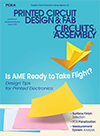Press Releases
April 22, 2022 - Corona California - Aqueous Technologies is proud to celebrate 30 years in business. Established in 1992 in response to the Montreal Protocol which eliminated many of the cleaning solvents commonly used to clean post-reflow circuit assemblies. Beginning with a single cleaning machine in 1992, Aqueous Technologies’ product line has expanded over the past thirty years to fifteen equipment products including seven post-reflow cleaning/defluxing systems, three stencil cleaning systems, and four ionic contamination testing systems. In addition to its standard product line, Aqueous Technologies also builds equipment under private label agreements for other companies. One hundred percent of Aqueous Technologies’ products are designed and built at its state-of-the-art manufacturing center located in Corona CA.
Indium Corporation will feature its metal thermal interface materials (TIMs) for burn-in and test at TestConX, May 1-4 in Mesa, Ariz., U.S.
Since partnering with Essemtec a year ago, Altus Group, a leading distributor of capital equipment in the UK and Ireland, has seen great interest in the Swiss company’s unique range of highly flexible SMT pick and place and dispensing solutions, with sales continuing to look healthy in 2022.
MULLICA HILL, NJ ― April 2022 ― Insituware LLC, the developer of the first smart measurement solution for quality control of materials, is pleased to announce plans to exhibit in Hall 5, Stand 228 at SMTconnect, scheduled to take place May 10-12, 2022 in Nuremberg. The Insituware team will demonstrate the Vision MARK-1 and provide additional insight for its two newest products, the SM-100 Solder Paste Smart Mixer and the CC-100 Conformal Coating Thickness Tester.
PCB manufacturers benefit from new high-quality hand soldering and rework stations, fume extractors and more
April 26 & 27, 2022
iNEMI’s PCB & Laminates Technology Integration Group (TIG) has identified thermoset hybrid PCB reliability as a critical focus area. Combining standard laminates with layers of low loss dielectric materials can provide the electrical performance required to meet an increasing range of high frequency applications at minimum cost. However, this combination of dissimilar resin materials has associated challenges for PCB manufacturing processes and can result in a reduction in durability and reliability, often only apparent as a field failure.


